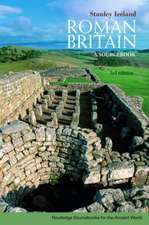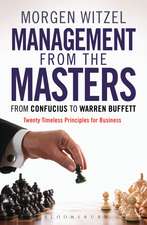The Road to Crecy: The English Invasion of France, 1346
Autor Marilyn Livingstone, Morgen Witzelen Limba Engleză Hardback – 19 noi 2004
A few hours later, all was over. Thousands of French knights and auxiliary troops lay dead or dying on the slopes of the ridge, shot down as they advanced by English and Welsh archers. King Philip, wounded twice by enemy arrows, had fled the field. The events of those few hours had changed the course of the Hundred Years War, the balance of military power in Western Europe, and the nature of warfare itself.
Preț: 1006.26 lei
Preț vechi: 1105.78 lei
-9% Nou
Puncte Express: 1509
Preț estimativ în valută:
192.55€ • 205.90$ • 160.54£
192.55€ • 205.90$ • 160.54£
Carte disponibilă
Livrare economică 28 martie-11 aprilie
Livrare express 13-19 martie pentru 40.46 lei
Preluare comenzi: 021 569.72.76
Specificații
ISBN-13: 9780582784208
ISBN-10: 0582784204
Pagini: 384
Dimensiuni: 156 x 234 x 34 mm
Greutate: 0.74 kg
Ediția:New.
Editura: Taylor & Francis
Colecția Routledge
Locul publicării:Oxford, United Kingdom
ISBN-10: 0582784204
Pagini: 384
Dimensiuni: 156 x 234 x 34 mm
Greutate: 0.74 kg
Ediția:New.
Editura: Taylor & Francis
Colecția Routledge
Locul publicării:Oxford, United Kingdom
Public țintă
UndergraduateCuprins
1 The Road to War 2 The Antagonists 3 Preparations 4 St-Vaast to Carentan 5 Carentan to Caen 6 Caen to Elbeuf 7 Elbeuf to Poissy 8 Poissy to Airaines 9 The Somme 10 Crécy-en-Ponthieu 11 Aftermath Appendix Bibliography
Descriere
The Road to Crécy tells the story of the English expedition to France in 1346 which climaxed with the battle of Crécy. On 26 August 1346, an English army of perhaps 12,000 men under the command of King Edward III faced a combined French and German force five times their number under King Philip VI. A few hours later, thousands of French knights and auxiliary troops lay dead or dying on the slopes of the ridge, shot down as they advanced by English and Welsh archers. King Philip, wounded twice by enemy arrows, had fled the field. The events of those few hours had changed the course of the Hundred Years War, the balance of military power in Western Europe, and the nature of warfare itself.













